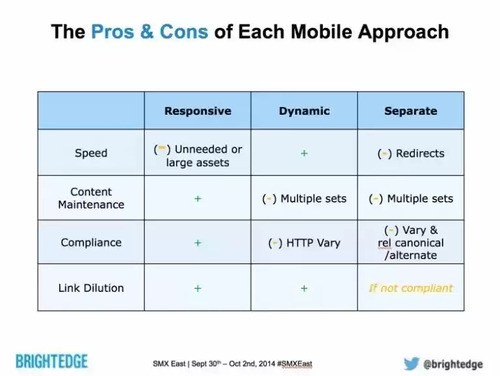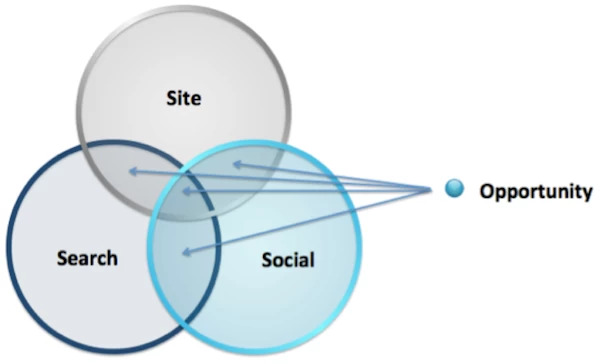The New Year is the perfect time to look at the 2015 SEO trends to determine what's helping or hurting your brand. Most of the 2015 SEO trends are continuations from last year where it was important to create quality content, be active on social media and focus on your mobile user.
The line between SEO and other integrated marketing efforts continue to blur. If you don't keep the predictions below in mind and act on them, these 2015 SEO trends might be how your competitors steal your thunder:
- Content reigns
- Websites must be mobile-search friendly
- SEO will integrate further with social media
- Earned links increase in value
- Links won't have to be links
1. Content reigns
There's a balance to be found when it comes to creating, optimizing and distributing content. You want it to be easy to digest, especially for mobile readers. However, your website's content should be unique and not so shallow or mundane that it can easily be found from other sources. Many sites aim for articles between 500 and 700 words, but you shouldn't be afraid to increase word count if you're the expert on a subject.
While Google may cherry pick some of your content if it is useful -- and formatted correctly -- you want the users to ultimately visit and read from your links. Those impressions and potential sales, comments or subscriptions that your brand relies on won't come if you don't offer something unique to the reader.
Furthermore, content doesn't come just in the form of text. For example, video and audio content can be optimized for the search engine -- and you should already be using alt text with the images on your website and in your blog posts.
A combination of informative, entertaining or engaging written, visual and even audio content will draw in visitors and keep them coming back for more as long as you use the proper markup, so Google knows where to add your link in the SERPs.
2. Websites must be mobile-search friendly
By now, few companies that are serious about their online presence are languishing in the days of Web 1.0 with a website that's not mobile-friendly. However, you might be in for some bad news if you've not stayed up with that trend. In 2015 websites don't have to be just mobile- friendly -- they have to be mobile-search-friendly.

So what does mobile-search-friendly mean?
Users must be able to find your site through the local queries they would make on a mobile device. At the same time, also evolve your ability to appear relevant to the semantic or thematic queries that are more likely on mobile.
Understand these queries by tracking your most active mobile landing pages. Conversely, as people become more proficient on mobile typing input, you may also have opportunities to capture traffic with strong intent, which means and long-tail keywords will be more useful to your SEO efforts than short keywords. For example, people might input queries about how to do something on a mobile device or fix a problem.
Mobile-search friendly also means that Google and other search engines have to be able to read your mobile site easily. If, for some reason, you're still using Frames, JavaScript or Flash that would prevent this, you're missing out on traffic because you are making it harder for Google to read it. Mobile users can't view that content either. And make sure to test and optimize your mobile page load speeds on mobile devices.
However, it could be even worse than that if Google starts to actively penalize sites that aren't optimized for users on mobile search and browsing from their phones or tablets. If you've managed to struggle along this far, 2015 might be the year when your efforts fall flat if Google formally introduces or increases weight of mobile optimization in the algorithm for rank on all devices.
Choosing the right approach to mobile is a key factor in corresponding success.
Last year BrightEdge released a report that observes, “over one in four mobile sites are misconfigured, leading to a massive loss of potential traffic. Marketers and publishers must consider their approaches to mobile design carefully and to think about how users interact with their content.”
Jim Yu, CEO of BrightEdge also shares key mobile tips for 2015 SEO trends in Mobile Commerce magazines outlook report.
3. SEO will integrate further with social media
While the interplay between SEO and social media is nothing new, SEO experts can no longer pretend that social media management and search engine optimization are two separate things.
Departments are merging and people who used to focus on one aspect will have to expand their knowledge and skills to be able to do it all. The companies and people able to do both will certainly benefit.
What about Google+, Authorship and Google's own attempts at melding social media with search engine optimization? Some people have already called Authorship a failed experiment, and while it won't hurt you to continue claiming the high-quality content you've contributed to the Internet, expect to see a renewed push toward social cues on established social networks, such as Twitter and Facebook.
With these 2015 SEO trends, "Likes," retweets and other cues have long contributed to content floating toward the top of the SERPs. It's important to remember that this is correlation and not causation, however. If a link is frequently shared on social media, especially long after it was created, the content creators have done something right well beyond a click-bait title. It may be humorous, informative or controversial, but there's a valid content reason why people are sharing it.
4. Earned links increase in value
A penny earned might be a penny saved, but a link earned won't see the Google hounds sent on you. Create content that other people want to share again and again. This is the content that will go viral on Facebook, and Google will take those cues into consideration.
Don't forget about collaborating with other content creators and influencers, either. Build long-lasting relationships with influencers. While brands will certainly get a boost when it comes to SEO, they also get the power of outspoken bloggers who will stand by a brand they love.
Ambassadorship with a single influential personality can instantly expose thousands of their fans to your brand. A continued relationship with those content creators is far more valuable than purchasing a single sidebar link or guest post on a blog, too. A positive experience with this 2015 SEO trend means your brand may get name-dropped even when you're not asking for it, and long-term organic exposure is worth as much as ever.
If earned links increase in value, will un-earned links decrease in value? Not quite. Google has already made it clear that links that aren't earned, specifically those that are purchased, have no value. If you're caught using such tactics, you can be penalized, which could be the most career-limiting move for an SEO.
5. Links won't have to be links
Thus far much of search engine optimization has had to do with links, literally anchors between websites. You're not alone if you've focused your attention on creating content that will go viral, getting links from relevant sources, adding your own links to directories and other link-getting activities.
However, Google might just turn the links world on its head with this 2015 SEO trend if the search engine isn't just looking for direct links -- HTML anchors. Implied links aren't actual links at all. In fact, Google knows that people have abused links for the purpose of search engine optimization, so the search engine has turned its attention to implied links. This includes mentions of brands and even no-followed links, which website owners are carefully using to avoid possibly penalties from Google.
It makes sense for Google to start tracking implied links, such as brand mentions. After all, people who are naturally talking about the brands they know and love might not think or take the time to add an anchor in their posts or articles at all. This will certainly help brands who haven't focused heavily on SEO in the past, which means you could benefit if you've been treating consumers and partners well all along.
As Google has cracked down on black-hat SEO tactics over the past two years, SEO experts have been forced to skip the shortcuts and roll up their sleeves to see real results in search engine rankings.
If you've put in the elbow grease, your content optimization efforts should serve as a great foundation for visibility and traffic with these 2015 SEO trends and the coming changes.
